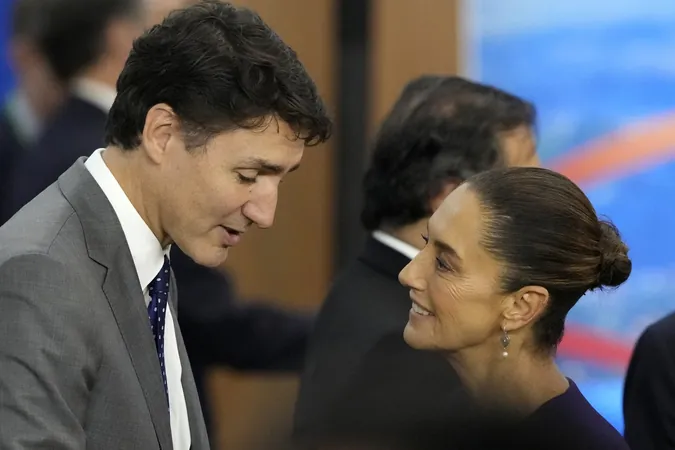
Mexico's Bold Move: Cutting Ties with Chinese Imports to Protect Trade Agreement
2024-11-23
Author: Olivia
Mexico's Strategic Shift
In a strategic shift, Mexico is responding to rising tensions around its role as a gateway for Chinese imports into North America. Faced with potential threats from a re-elected Donald Trump or a politically vulnerable Justin Trudeau, Mexican officials are taking action to secure their place in the U.S.-Mexico-Canada Free Trade Agreement (USMCA).
Cabinet's Initiative
In a press conference on Friday, President Claudia Sheinbaum of the ruling Morena party announced a government initiative aimed at encouraging local companies to replace Chinese components with domestically produced alternatives. “We have a plan to substitute these imports from China and to manufacture the majority of them in Mexico, utilizing Mexican and North American firms,” Sheinbaum declared.
Response to Global Supply Chain Crisis
This move comes in the wake of the 2021 global supply chain crisis, which revealed the vulnerabilities of the global manufacturing network, especially regarding semiconductor shortages that have critically impacted various industries. Although Sheinbaum claims that Mexico has been working on this initiative since then, the road ahead seems laden with obstacles. Even the United States has encountered challenges in relocating chip manufacturing despite significant financial incentives.
Implications for Auto Industry
The shift isn't just about maintaining jobs and production. Over the years, Mexico has become a hub for U.S. and foreign automakers looking to capitalize on lower labor costs, raising concerns in the U.S. about the potential for Chinese products undermining the American auto market. In response, Mexico is actively collaborating with private enterprises to bring parts production closer to home.
Local Chip Manufacturing Plans
“By next year, with a bit of luck, we are going to begin manufacturing microchips in Mexico,” said Economy Secretary Marcelo Ebrard. While these chips may not yet reach the sophistication of advanced technology, the commitment to establish local production marks a significant pivot in policy.
Regulatory Reforms and Concerns
In a surprising twist, the Morena party, which has historically resisted U.S. pressure, is moving to reform and eliminate several independent oversight agencies established by past administrations, including those responsible for regulating monopolies and ensuring transparency in energy sectors. This raises alarms among U.S. and Canadian officials since such measures are crucial for protecting foreign investments within the trade agreement framework.
Legislative Framework
Ebrard mentioned that the new legislative framework would align closely with what is currently accepted by the U.S., ensuring compliance with the trade pact—an effort to fortify Mexico's position within the USMCA and discourage any potential exit from the agreement during its next review in 2026.
Future Evaluations and Risks
Economic analyst Gabriela Siller from Banco Base underscored that this reform will be key during future reviews, stating, “If dissatisfaction arises, countries have the right to request annual evaluations and negotiate for ten years before any exits can occur.”
Skepticism About Renewal Efforts
Still, skepticism lingers. C.J. Mahoney, a former deputy trade representative in the Trump administration, noted during a conference at the Texas-based Baker Institute that while the U.S. would likely not withdraw from the agreement, rising criticisms could delay renewal efforts for years to come. “The costs of not renewing immediately are quite low, and there is a strong inclination to postpone decision-making,” he remarked.
Tariffs and Trade Relations
Meanwhile, the U.S. has imposed tariffs on Mexican steel and aluminum, aimed at curtailing the flow of Chinese materials disguised as Mexican products, putting additional strain on bilateral trade relations. Concerns were voiced by Senate Democrats, highlighting the rising risks to American jobs and national security.
Challenges Ahead
As Mexico intensifies its efforts to regulate and reduce Chinese imports, experts warn that achieving substantial independence from these imports will take time. “Reducing reliance on Chinese goods is not something that can be accomplished quickly,” cautioned José María Ramos, a public administration professor at the Colegio de la Frontera Norte in Tijuana.
Conclusion
The unfolding developments signal a critical juncture for Mexico, as it endeavors to solidify its industrial base while maintaining critical trade relations with its North American neighbors. The question remains: Can Mexico successfully pivot its economy in time to meet these mounting pressures? The unfolding story has major implications for the future of trade in North America.









 Brasil (PT)
Brasil (PT)
 Canada (EN)
Canada (EN)
 Chile (ES)
Chile (ES)
 España (ES)
España (ES)
 France (FR)
France (FR)
 Hong Kong (EN)
Hong Kong (EN)
 Italia (IT)
Italia (IT)
 日本 (JA)
日本 (JA)
 Magyarország (HU)
Magyarország (HU)
 Norge (NO)
Norge (NO)
 Polska (PL)
Polska (PL)
 Schweiz (DE)
Schweiz (DE)
 Singapore (EN)
Singapore (EN)
 Sverige (SV)
Sverige (SV)
 Suomi (FI)
Suomi (FI)
 Türkiye (TR)
Türkiye (TR)